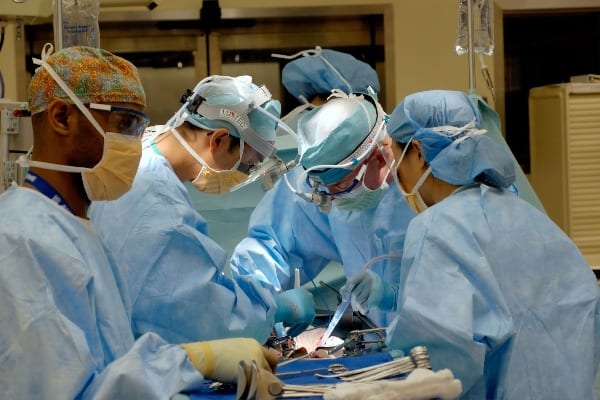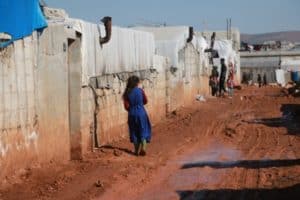This page contains affiliate links. This means if you a follow a link and make a purchase, at no additional cost to you, Humanitarian Careers will receive a commission. Thank you for supporting the site.
Joining the United Nations can be a great career. If you are a doctor and would like to work for the UN, there is a wide range roles across many UN agencies open to qualified health professionals.
We’ve put together this complete guide on how to get a UN job as a doctor. It includes which UN agencies frequently recruit doctors and what qualifications you will likely need. We also break-down the different types of roles open to doctors within the United Nations and how you can apply.
United Nations Agencies Recruiting Doctors
If you want to work as a doctor for the United Nations, the first thing you need to do is understand which parts of the UN recruit medical staff. The UN is a huge organization. It has political bodies such as the General Assembly and Security Council, as well as 15 specialized agencies.
Doctors who are looking to join the United Nations should search for jobs within the relevant UN agencies. The main UN agencies that recruit doctors are:
- World Health Organization
- UNFPA – United Nations Population Fund
- UNICEF – UN’s children’s agency
- UN High Commission for Refugees
- World Food Programme
- International Organization for Migration
- UN Volunteers
The above is not a complete list of UN agencies that recruit doctors, but these are definitely the ones to check first. Now, let’s take a quick look at each one and have an overview of the wider UN structure and how to join as a doctor.
The UN’s public health agency is the World Health Organization. It’s mandate it to improve global health, research public health risks and promote health and wellbeing around the world. The WHO is probably the largest UN agency recruiting doctors.
UNFPA is the UN Population Fund. It is tasked with improving and promoting reproductive health worldwide. It runs projects all over the world on maternal health issues, as well as working with governments to improve their healthcare outcomes in relation to reproductive health. UNFPA has a range of roles open to qualified doctors, especially those with experience in sexual and reproductive health.
UNHCR is the United Nations refugee agency. It provides assistance to forcibly displaced and stateless people around the world. Refugees and IDPs are often in need of medical care and there are often jobs for doctors with UNHCR and their partner organizations.
UNICEF is the United Nations children’s fund. They do humanitarian and development work aimed at improving the lives of children around the world. There work includes child healthcare, immunizations, HIV programmes for children and mothers and childhood nutrition projects. There are often jobs for doctors on UNICEF programmes.
The World Food Programme (WFP) works to address world hunger and prevent food insecurity around the world. Through directly providing food aid, as well as running projects to fight malnutrition, WFP aims to prevent the severe health impacts that can be caused by a lack of food. As the world’s largest humanitarian organization, there are a huge range of positions within WFP, including for qualified doctors.
The International Organization for Migration (IOM) is the UM agency tasked with providing assistance to people on the move. It runs projects directly assisting migrants and refugees, as well as providing advice to governments on migration issues. IOM became part of the United Nations in 2016. There are a wide range of jobs for doctors within IOM working directly with migrants, refugees and displaced people.
A final UN organization that often provides positions for doctors is the UN Volunteers scheme. UN Volunteers are deployed to support UN projects on short-term missions. To become a UN Volunteer you often need a relevant professional background and qualified doctors can find positions with them.
Humanitarian Health Online Courses
If you are looking to work as a doctor with the UN, a great addition to your CV is an online course. We think the Emory University course on Health in Complex Humanitarian Emergencies is one of the best. It covers the key concepts of healthcare in humanitarian contexts. Follow the link to the course’s page.
We also highly recommend the University of Copenhagen’s online short course in Non-Communicable Diseases in Humanitarian Settings. It only takes around 15 hours to complete, and we think it’s ideal for those wanting to become a doctor with the UN. Click the link to find out more.
Another online course we recommend for those looking to work as a UN doctor is the Manchester University Global Health and Humanitarianism course. It’s a fantastic overview of both the theory and practice of humanitarian aid and public health. The link is to the course’s page with more information.
Qualifications Needed To Join The UN As A Doctor
When starting a career in the UN as a doctor, you need to understand that there are two main steps to getting the right qualifications. The first is becoming fully qualified as a doctor.
In all countries, doctors need to have completed medical school in order to practice. This includes a number of years of university level study followed by several years of on-the-job learning. To work for the UN as a doctor you need to have completed all of your studies. You will need to be able to work fully as a doctor in your home country before applying for roles with the United Nations.
Jobs with the United Nations are very competitive. The UN will also expect you to bring substantial knowledge and experience to the role. For both of these reasons, it is best to be fully practicing as a doctor before applying for roles with the UN.
Sadly, the United Nations will not cover the cost of your training to become a doctor. There are also not UN roles for doctors-in-training or that you can take before you gain your medical qualifications.
The second step to getting a job with the United Nations as a doctor is to get the specialised knowledge and skills the UN requires in their medical teams.
Jobs within the United Nations often require specific knowledge and experience. For medical roles within the UN, you are likely to need technical experience in areas such as humanitarian aid, development assistance, public health, sexual and reproductive health, mother and child nutrition, emergency care, HIV/aids and communicable diseases, and medical training. These are just examples of some of the technical areas the UN will look for knowledge of when hiring doctors.
There are a huge range of technical areas that the UN hires doctors for. If you want to work for the United Nations in a medical role, you should choose to specialise in an area related to the UN’s work.
A great way to gain additional knowledge in areas related to the UN’s work is by doing short courses in addition to your medical studies. Many short courses can be taken online, often for a free. There are also online courses offered by UN agencies that you can take.
Gaining as much knowledge as possible in the technical areas of medicine that the UN specializes in, in addition to completing your formal medical training, are the key steps you need to become qualified to work for the United Nations as a doctor.
United Nations Medical Roles For Doctors
There is a wide range of jobs for doctors within the United Nations. Medically trained staff can work for many different parts of the UN.
The different kinds of roles doctors usually take on within the UN can roughly be broken down into five categories:
- Management
- Frontline Medical Staff
- Advocacy
- Working for Partner Organizations
- Capacity Building
Let’s briefly go over each one…
Many doctors work for the United Nations in management positions. These jobs oversee health projects that are ran by UN agencies. They require managing the project team, monitoring the budget, developing plans and ensuring the project meets the required outcomes. For many health projects the UN will hire management with a medical background who can ensure the quality of the programming from both an operational and medical standpoint.
In many countries the United Nations runs frontline health projects. These provide medical care to people affected by humanitarian crises or living in poverty and destitution. The UN recruits’ doctors to work on these projects directly providing care to people. If you are a healthcare professional and want to work as a doctor for the UN, explore these types of projects.
Campaigning and advocay are important parts of what the UN does. Different United Nations agencies campaign on different topics either promoting causes or working to change the public perception of an issue. For many health-related campaigns, the UN will recruit doctors to help them create and review materials, as well as develop strategies for communicating messages to communities.
The United Nations runs many of its project through implementing partners. This means the UN coordinates a local organization to run the project. If you are a doctor wanting to work for the United Nations, explore jobs with UN partners. This can be a great way to gain experience working on UN projects before making the transition to working directly for the United Nations.
Finally, the United Nations works with many local governments, NGOs and civil-society groups with the aim of building their capacity. This means the UN conducts trainings to develop these organizations’ ability to respond to crises. There are many positions for doctors working on UN capacity building projects, especially related to medicine and public health.

Applying for UN Medical Jobs
The UN hiring process is notoriously complex. If you are looking to join the United Nations as a doctor you will need a basic understanding of the different positions and categories within the UN, and the different terminology used in the UN recruitment process.
Jobs in the UN are basically divided into two categories. These are known as P, or ‘professional’ roles, and G or ‘general service’ roles. The naming is unfortunate as there is really nothing more professional about the P jobs.
The main difference between P and G roles is how and where they are recruited,
In the United Nations, P jobs are recruited for internationally. People working in P roles within the UN work as expats on UN projects. Often people working in P jobs move between different UN postings around the world.
G roles with the UN are hired in the country of the United Nations project. People recruited for G positions must be nationals of the country where the UN project is based.
The UN also has the jobs category D. These positions are essentially the same as P roles but at a more senior level.
As well as each UN jobs having a letter code that shows the type of position it is and how it’s recruited, every role within the United Nations is also given a number. The number of a role shows how senior the position is, as well as how many years of experience are needed for the job. This is why you will see UN jobs listed as P-4 or G-3.
If you are looking to join the United Nations as a doctor, the jobs you apply to will be determined your years of relevant work experience and if you plan to work in your home country or abroad.
At the beginning of your career it can be good to apply for medical roles within the UN in the G category. This is if the United Nations has medical projects in your country. By doing this you can gain more experience and you are likely to rise up the level of G roles. You can then transfer to P positions that require medical experience once you have gained work experience within the UN.
Another good path to beginning a career as a doctor within the UN is to start by working for medical humanitarian and development NGOs. After gaining relevant experience working abroad, you could begin applying for P positions within the United Nations. The combination of your medical background and field experience working for NGOs will likely make you a strong candidate.
Alongside the fixed-term and permanent jobs, the UN also hires a huge number of consultants. Consultants are hired by the United Nations to provide specific technical advice to UN projects. If you have extensive experience working on medical programmes, especially in humanitarian and development settings, applying for UN consultancies can be a great way to work for the UN as a doctor.
As we discussed briefly above, another great way to begin a career in the United Nations as a doctor is to join the UN Volunteer scheme. UNV deploys volunteers to support UN projects around the world. Postings usually last a few months and it can be a great way to gain frontline experience working for the UN. UNV often recruits people with specialist and technical profiles and there are often positions for medical graduates and doctors.
Finally, the UN runs programmes that are designed for recent graduates and young people who want to work for the United Nations. The largest schemes like this are the Junior Professional Officers scheme, the Young Professionals Programme and the UN Internship Programme. The aim of these programmes is to give new recruits a broad overview of the UN system and the work the UN does. These schemes do not generally have technical medical roles. However, if you are a recently qualified doctor looking to work for the UN, consider joining these schemes before moving into a more technical medical role later in your career.
If you want to learn more about how to become a doctor with the United Nations, explore our list of the top humanitarian health online courses here.






